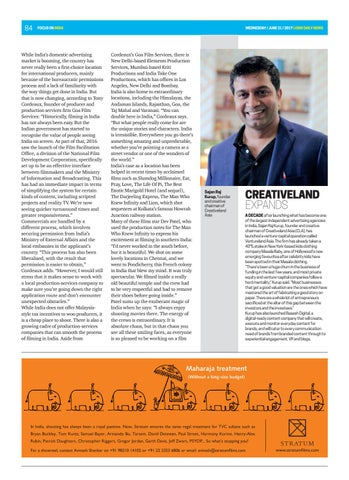84
FOCUS ON INDIA
While India’s domestic advertising market is booming, the country has never really been a first-choice location for international producers, mainly because of the bureaucratic permissions process and a lack of familiarity with the way things get done in India. But that is now changing, according to Tony Cordeaux, founder of producer and production services firm Goa Film Services: “Historically, filming in India has not always been easy. But the Indian government has started to recognise the value of people seeing India on screen. As part of that, 2016 saw the launch of the Film Facilitation Office, a division of the National Film Development Corporation, specifically set up to be an effective interface between filmmakers and the Ministry of Information and Broadcasting. This has had an immediate impact in terms of simplifying the system for certain kinds of content, including scripted projects and reality TV. We’re now seeing quicker turnaround times and greater responsiveness.” Commercials are handled by a different process, which involves securing permission from India’s Ministry of External Affairs and the local embassies in the applicant’s country. “This process has also been liberalised, with the result that permission is easier to obtain,” Cordeaux adds. “However, I would still stress that it makes sense to work with a local production-services company to make sure you’re going down the right application route and don’t encounter unexpected obstacles.” While India does not offer Malaysiastyle tax incentives to woo producers, it is a cheap place to shoot. There is also a growing cadre of production-services companies that can smooth the process of filming in India. Aside from
D5-Lions-13 india+D+BAF.indd 84
WEDNESDAY / JUNE 21 / 2017 LIONS DAILY NEWS
Cordeaux’s Goa Film Services, there is New Delhi-based Elements Production Services, Mumbai-based Kriti Productions and India Take One Productions, which has offices in Los Angeles, New Delhi and Bombay. India is also home to extraordinary locations, including the Himalayas, the Andaman Islands, Rajasthan, Goa, the Taj Mahal and Varanasi. “You can double here in India,” Cordeaux says. “But what people really come for are the unique stories and characters. India is irresistible. Everywhere you go there’s something amazing and unpredictable, whether you’re pointing a camera at a street vendor or one of the wonders of the world.” India’s case as a location has been helped in recent times by acclaimed films such as Slumdog Millionaire, Eat, Pray, Love, The Life Of Pi, The Best Exotic Marigold Hotel (and sequel), The Darjeeling Express, The Man Who Knew Infinity and Lion, which shot sequences at Kolkata’s famous Howrah Junction railway station. Many of these films star Dev Patel, who used the production notes for The Man Who Knew Infinity to express his excitement at filming in southern India: “I’d never worked in the south before, but it is beautiful. We shot on some lovely locations in Chennai, and we went to Pondicherry, this French colony in India that blew my mind. It was truly spectacular. We filmed inside a really old beautiful temple and the crew had to be very respectful and had to remove their shoes before going inside.” Patel sums up the exuberant magic of India when he says: “I always enjoy shooting movies there. The energy of the crews is extraordinary. It is absolute chaos, but in that chaos you see all these smiling faces, as everyone is so pleased to be working on a film
Sajan Raj Kurup, founder and creative chairman of Creativeland Asia
CREATIVELAND EXPANDS A DECADE after launching what has become one of the largest independent advertising agencies in India, Sajan Raj Kurup, founder and creative chairman of Creativeland Asia (CLA), has launched a venture-capital operation called Ventureland Asia. The firm has already taken a 40% stake in New York-based kids clothing company Masala Baby, one of Hollywood’s new emerging favourites after celebrity kids have been spotted in their Masala clothing. “There’s been a huge churn in the business of funding in the last few years, and most private equity and venture-capital companies follow a herd mentality,” Kurup said. “Most businesses that get a good valuation are the ones which have mastered the art of fabricating a good story on paper. There are a whole lot of entrepreneurs sacrificed at the altar of this gap between the investors and the investees.” Kurup has also launched Baaash Digital, a digital-ready content company that will create, execute and monitor everyday content for brands, and will cater to every communication need of brands from branded content through to experiential engagement, VR and blogs.
20/06/2017 18:34
